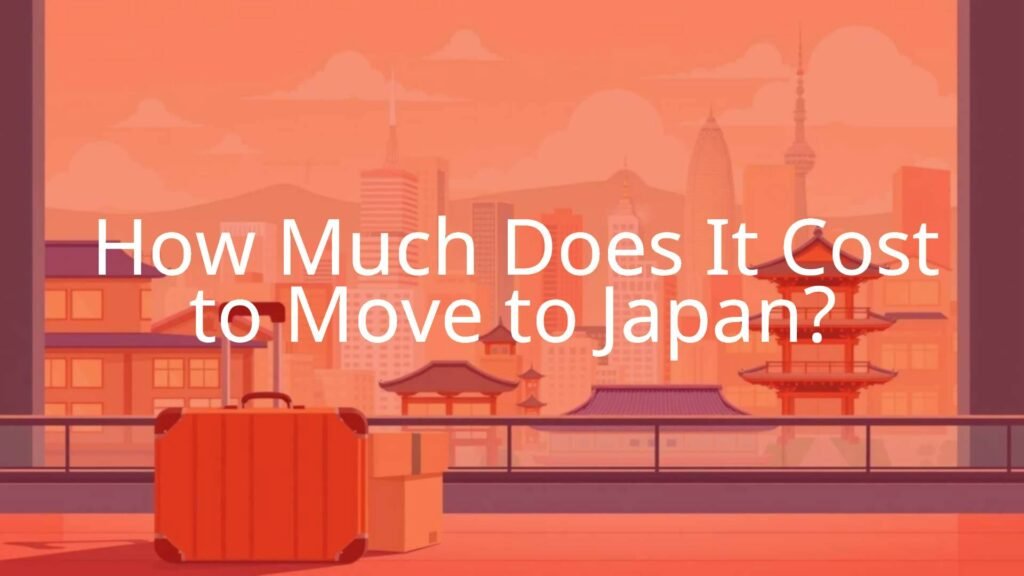Thinking about moving to Japan can be very exciting, thanks to its mix of traditional culture and modern technology. However, moving abroad is a big step and requires good financial planning. So, what is the actual cost to move to Japan? The answer depends on several factors like your lifestyle, what city you choose, and your personal situation. Generally, a reasonable starting budget is about ¥620,000 to ¥750,000 (roughly $4,500 to $5,500 USD). This amount usually covers the initial rental deposits, the first month’s rent, some basic home setup, and a couple of months of living costs before you receive your first salary. This does not include your plane ticket or visa application fees. If you bring lots of belongings or want a more comfortable move, costs can rise quickly. Knowing the main types of costs involved is one of the best ways to prepare for your new life in Japan.

Main Costs When Moving to Japan
Several things affect the cost of moving to Japan:
- Departure Country: Costs for flights and shipping will change depending on how far you are from Japan.
- Household Size: A single person will, of course, spend less than a family.
- Lifestyle: Using local transport and cooking at home costs less than frequent dining out or taking taxis.
- City Choice: Tokyo is known for being expensive, while smaller cities or rural areas are cheaper.
- Exchange Rate: Changes in the value of the yen can make things more or less expensive in your home currency.
- Relocation Benefits: If your job includes help with flights, housing, or other arrangements, your out-of-pocket costs will be much lower.
Your visa type and employment status also matter. Some companies cover flights, provide temporary housing, or help with deposits. A good move to Japan usually starts with understanding all these costs and making a careful, realistic plan that matches your situation.
International Moving Cost Ranges
Moving to Japan from another country is rarely cheap, and the island location makes shipping costs higher, especially from places like the USA. Here’s an overview of typical full-service moving costs from the US:
| Home Size | Typical Cost |
|---|---|
| Studio/1 Bedroom | $1,680 – $5,840 |
| 2-3 Bedroom | $2,200 – $8,050 |
| 4+ Bedroom | $3,885 – $10,300 |

Choosing moving containers or freight shipping can reduce costs, but moving overseas is still a large expense. These estimates usually only include shipping. You might still face extra costs like gas, hotels during transit (for DIY moves), or surprise expenses. It’s always smart to get several quotes and check what’s included.
Visa and Documents Costs
You need a visa to live in Japan, which always means extra paperwork and fees. The most common long-term visa types are work, student, and dependent visas. Each has a different process and required documents:
- Work visa (requires a job offer and employer sponsor)
- Student visa (needs proof of acceptance into a school)
- Dependent visa (for spouses and children of those with a valid visa)
Typical costs include:
| Item | Cost |
|---|---|
| Visa Application | ¥3,000 – ¥6,000 ($20 – $40 USD), can go up to $90 |
| Document Translation and Legalization | Varies (depending on number and type of documents) |
Documents like birth and marriage certificates, college transcripts, or police checks might need official translation into Japanese and sometimes an apostille or government stamp to be accepted. These additional steps can add to your timeline and upfront costs, so it’s best to start early.
Flights and Arrival Expenses
Your airfare to Japan is another major upfront cost. Ticket prices depend on your departure city, season, direct vs. connecting flights, and how far ahead you buy.
| Departure From | One-Way Airfare |
|---|---|
| USA (average) | ¥80,000 – ¥200,000 ($550 – $1,350 USD) |
Traveling in peak season (spring and autumn) usually costs more. Booking early and being flexible with your travel dates can save you money. Use travel sites and set price alerts to find the best deals.
Once you arrive, plan for local transport from the airport to your accommodation. You might spend ¥5,000-¥10,000 ($35-$70 USD) on a train, bus, or taxi, depending on your location and amount of luggage. Bring some Japanese yen for these immediate expenses.
Shipping and Moving Services
Deciding how to send your belongings to Japan is a big part of your move. The two main options are air freight and sea freight:
| Type | From USA | From Europe |
|---|---|---|
| Air (1 m³) | $1,500-$3,000 | €1,200-€2,500 |
| Sea (20 ft container) | $2,500-$5,000 | €2,000-€4,000 |
| Sea (40 ft container) | $4,500-$8,000 | €3,500-€7,000 |
Air freight is faster (a few days to a week), but costs the most. Sea freight is slower (up to 11 weeks from the USA or Europe) but much cheaper, especially for heavy items. If you don’t need much, look at moving containers or freight companies for a cheaper option.
Moving companies can offer all-in-one services, including packing, shipping, customs, and delivery in Japan. Some of the better known ones include International Van Lines, Solomon & Sons, and Allied International Van Lines. Full-service costs can be high, but they save you a lot of work and hassle. Always get a few estimates and check for insurance to protect your things.
Cheaper alternatives include renting a moving container or using freight-only services. The less you ship, the less you pay, so selling or donating non-essential items can make a big difference. Some people also choose to ship small packages by post if they only need a few important things right away.
Initial Housing Costs in Japan
Getting an apartment is often the biggest one-time cost. Renting in Japan often comes with unique fees that are higher than in many other countries:
| Type of Fee | Description | Typical Amount |
|---|---|---|
| Key Money | Non-refundable gift to landlord | 1-2 months’ rent |
| Security Deposit | Refundable (if no damage) | 1-2 months’ rent |
| Agency Fee | Paid to the real estate agent | 1 month’s rent + tax |
| Guarantor Company | If you don’t have a Japanese co-signer | About half a month’s rent |
| Property Insurance | Required for tenants | ¥20,000 for 2 years ($135 USD) |
| Key Exchange | For changing the lock | ¥10,000-¥25,000 ($68-$170 USD) |
Altogether, it’s common to pay 5-6 months’ worth of rent before moving in. For example, initial costs could total ¥300,000 to ¥900,000 ($2,000-$6,100 USD) depending on your rent. You’ll also need to furnish your apartment because most rentals are unfurnished. Expect to spend around ¥100,000-¥150,000 ($675-$1,000 USD) for basics (bed, fridge, washing machine, table).

Secondhand shops and online classifieds are great for saving money on furniture, and stores like Nitori have affordable options. 100-yen shops are good for kitchen tools, stationery, and small items.
Monthly Living Expenses in Japan
Your monthly spending depends mostly on where you live and your lifestyle. Basic living costs (not including rent) for one person usually run between ¥115,000 and ¥200,000 ($780-$1,350 USD) per month. Including rent, the total is about ¥148,000 – ¥314,000 ($1,000-$2,100 USD).
- Utilities: ¥8,000-¥24,000 ($55-$160 USD), varies by apartment size and season. Internet is typically ¥4,000-¥6,000 ($27-$40 USD). Mobile plans start from ¥2,000 ($14 USD) a month.
- Groceries and Food: A single person spends about ¥41,000 ($280 USD) per month. Cooking at home with local foods is cheapest. Eating out ranges from ¥500-¥3,000 ($3.40-$20 USD) per meal.
Other recurring costs can include apartment renewal fees (up to one month’s rent), cleaning fees at move-out, monthly building fees, pet-related fees if applicable, and health insurance deductions from your salary. Also, setup costs for things like a bank account or mobile contract can bring small extra charges.
Transportation Costs
Japan’s train and subway systems are very reliable. A single train trip costs ¥150-¥210 ($1-$1.40 USD), but most commuters buy a monthly pass (teikiken), which saves money. Companies often reimburse commuting costs. Buses and taxis are options too-taxis are more expensive. A one-day train pass is about ¥600 ($4 USD) and is handy for sightseeing.
Having a car is rare and often not necessary in the cities, but it helps in rural areas. Upfront costs include buying the car, insurance, mandatory inspections, and the cost of a parking space (required in cities to even own a car). Car prices start around ¥1.3 million ($8,800 USD). Maintenance, gas, parking, and tolls add up fast, making it a pricey choice for most newcomers.
Healthcare and Insurance
Japan has a strong and efficient public health insurance system that every resident must join. This covers about 70% of your medical bills, so out-of-pocket costs are low. The premium is usually about 5% of your income, between ¥5,000 and ¥50,000 ($34-$340 USD) per month, depending on your earnings.
- Typical costs with insurance: Clinic visit ¥5,000-¥10,000 ($34-$68 USD), hospital visit or emergency room up to ¥15,000 ($100 USD).
- Private insurance: Extra coverage is available starting around ¥6,700 ($45 USD) per month, but most residents find the public system is enough.
Out-of-pocket medical costs rarely cause financial problems, as monthly caps prevent very high bills.
Education and Language Study
If you’re moving with children or want to learn Japanese, keep these costs in mind:
- Public School: Basically free, with minor fees for supplies, trips, and uniforms.
- International/Private School: Around ¥2,000,000 ($13,500 USD) per year for full tuition.
- University Tuition: Public: ¥535,800 ($3,600 USD)/year. Private: about ¥1,100,000 ($7,400 USD)/year.
- Japanese Language School: 12-week course: ¥200,000-¥400,000 ($1,350-$2,700 USD). One-year: ¥750,000-¥850,000 ($5,100-$5,750 USD) plus living costs.
Cheaper weekly Japanese lessons can often be found at local community centers.
Regional Differences in Living Costs
Costs change a lot across Japan. Tokyo is the most expensive, with high rent and living expenses:
- Tokyo: One-room apartment in the city center starts at about ¥100,000 ($675 USD) per month. Monthly living expenses are about ¥143,000 ($970 USD) without rent.
- Osaka, Nagoya, Fukuoka, Nara: Lower rent, cheaper food, and other bills. For example, Fukuoka averages about ¥62,000 ($420 USD) per month for a student’s total living costs.
Best value cities:
- Osaka: Big city feel, lower prices than Tokyo.
- Nagoya: Good mix of culture and affordability.
- Fukuoka: Relaxed, low-cost living.
- Nara: Quiet, much lower rent.

Think about what you value most-city life, lower costs, quieter living-when choosing your destination in Japan.
How Much Should You Save Before Moving?
Most people suggest saving at least $2,500-$5,000 USD (¥370,000-¥740,000) before making the move, with $6,000+ being even better. This will help you cover your deposit, setup costs, and two or three months’ living expenses. For a stress-free start, try to save between ¥800,000 and ¥1,000,000 ($6,000-$7,500 USD). This will cover most major costs and any emergencies during your first months in Japan.
Here’s a table with key upfront costs:
| Expense | Low Estimate | High Estimate |
|---|---|---|
| Visa Application Fees | ¥3,000 ($20 USD) | ¥10,000 ($70 USD) |
| One-Way Flight | ¥50,000 ($350 USD) | ¥150,000 ($1,000 USD) |
| Initial Housing (deposits, fees) | ¥250,000 ($1,700 USD) | ¥900,000 ($6,100 USD) |
| First Month’s Rent | ¥50,000 ($350 USD) | ¥150,000 ($1,000 USD) |
| Furnishings & Appliances | ¥100,000 ($675 USD) | ¥150,000 ($1,000 USD) |
| Two Months Daily Expenses | ¥300,000 ($2,000 USD) | ¥300,000 ($2,000 USD) |
| Emergency Savings | ¥200,000 ($1,350 USD) | ¥200,000 ($1,350 USD) |
The total minimum is about ¥620,000-¥750,000 ($4,500-$5,500 USD), but may be up to ¥1,500,000 ($10,000 USD) for those shipping more or living in Tokyo. Jobs with company-provided relocation support make the process cheaper.
FAQs About Moving Cost to Japan
How much does a Japan visa cost?
Visa application fees are usually between ¥3,000 and ¥6,000 ($20-$40 USD), but can sometimes be up to $90, depending on your home country. Remember, there may be extra costs for document translation or official stamps.
What’s the average rent in Japan’s big cities?
Rent is highest in Tokyo, with one-room apartments downtown costing about ¥87,000 ($590 USD) a month or more. In Osaka, similar places go for ¥60,000-¥80,000 ($400-$540 USD), and Fukuoka is even cheaper at ¥40,000-¥55,000 ($270-$370 USD). The national average is roughly ¥50,000-¥70,000 ($340-$475 USD) monthly.
What are some extra costs I should expect?
Get ready to pay for key money, security deposit, agency fees, and possibly guarantor or cleaning fees. You’ll also need to buy furniture, pay for internet and utilities, and have emergency funds. Document translation and legalization can also come up as extra costs.
Is it cheaper to move to Japan compared to other countries?
Japan, outside Tokyo, is often cheaper than other developed countries. Rent is lower than in cities like New York or San Francisco. Healthcare is universal and affordable, with capped out-of-pocket costs. The public transportation system means you usually won’t need a car. While startup costs, especially for apartments, are higher than some places, regular monthly expenses can be much less.
Summary and Budget Planning Tips
Moving to Japan is a big project that needs planning, patience, and good budgeting. The biggest early costs come from the rental system with its separate fees for key money, deposits, and more. But if you understand these costs and plan ahead, you can avoid most money surprises.
After you arrive, you’ll find that well-managed costs-helped by affordable public transport and reliable health care-make life in Japan easier than many expects. Local supermarkets, public transit, and free cultural events can help you save every month.
Moving to Japan does cost money, but it brings you the chance to enjoy a unique society, safety, and lots of chances to learn and grow. With careful research and smart spending, your new life in Japan is possible. Start saving now, plan your budget, and get ready to experience all that Japan has to offer.
- What Is a Maiko? - July 13, 2025
- What Does Domo Arigato Mean? - July 12, 2025
- What Does Naruto Mean? - July 12, 2025









